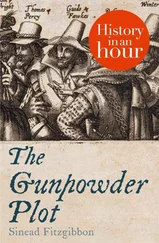John Gerard - What was the Gunpowder Plot? The Traditional Story Tested by Original Evidence
Здесь есть возможность читать онлайн «John Gerard - What was the Gunpowder Plot? The Traditional Story Tested by Original Evidence» — ознакомительный отрывок электронной книги совершенно бесплатно, а после прочтения отрывка купить полную версию. В некоторых случаях можно слушать аудио, скачать через торрент в формате fb2 и присутствует краткое содержание. Жанр: foreign_antique, foreign_prose, на английском языке. Описание произведения, (предисловие) а так же отзывы посетителей доступны на портале библиотеки ЛибКат.
- Название:What was the Gunpowder Plot? The Traditional Story Tested by Original Evidence
- Автор:
- Жанр:
- Год:неизвестен
- ISBN:нет данных
- Рейтинг книги:5 / 5. Голосов: 1
-
Избранное:Добавить в избранное
- Отзывы:
-
Ваша оценка:
- 100
- 1
- 2
- 3
- 4
- 5
What was the Gunpowder Plot? The Traditional Story Tested by Original Evidence: краткое содержание, описание и аннотация
Предлагаем к чтению аннотацию, описание, краткое содержание или предисловие (зависит от того, что написал сам автор книги «What was the Gunpowder Plot? The Traditional Story Tested by Original Evidence»). Если вы не нашли необходимую информацию о книге — напишите в комментариях, мы постараемся отыскать её.
What was the Gunpowder Plot? The Traditional Story Tested by Original Evidence — читать онлайн ознакомительный отрывок
Ниже представлен текст книги, разбитый по страницам. Система сохранения места последней прочитанной страницы, позволяет с удобством читать онлайн бесплатно книгу «What was the Gunpowder Plot? The Traditional Story Tested by Original Evidence», без необходимости каждый раз заново искать на чём Вы остановились. Поставьте закладку, и сможете в любой момент перейти на страницу, на которой закончили чтение.
Интервал:
Закладка:
What was the opinion of his own countrymen, appeared with startling emphasis when, in 1612, the Earl died. On May 22nd we find the Earl of Northampton writing to Rochester that the "little man" is dead, "for which so many rejoice, and so few even seem to be sorry." 47 47 R.O. Dom. James I. lxix. 56.
Five days later, Chamberlain, writing 48 48 Ibid. , May 27, 1612. Bishop Goodman, no enemy of Cecil, is inclined to believe that at the time of the secretary's death there was a warrant out for his arrest. Court of King James , i. 45.
to his friend Dudley Carleton, to announce the same event, thus expresses himself: "As the case stands it was best that he gave over the world, for they say his friends fell from him apace, and some near about him, and however he had fared with his health, it is verily thought he would never have been himself again in power and credit. I never knew so great a man so soon and so openly censured, for men's tongues walk very liberally and freely, but how truly I cannot judge." On June 25th he again reports: "The outrageous speeches against the deceased Lord continue still, and there be fresh libels come out every day, and I doubt his actions will be hardly censured in the next parliament, if the King be not the more gracious to repress them." Moreover, his funeral was attended by few or none of the gentry, and those only were present whose official position compelled them. His own opinion Chamberlain expresses in two epigrams and an anagram, which, although of small literary merit, contrive clearly to express the most undisguised animosity and contempt for the late minister. 49 49 The first of these epigrams, in Latin, concludes thus: Sero, Recurve, moreris sed serio; Sero, jaces (bis mortuus) sed serio: Sero saluti publicæ, serio tuæ. The second is in English: Whiles two RR's, both crouchbacks, stood at the helm, The one spilt the blood royall, the other the realm. A marginal note explains that these were, "Richard Duke of Gloster, and Robert Earl of Salisburie;" the anagram, of which title is "A silie burs." He also styles the late minister a monkey ( cercopithecus ) and hobgoblin ( empusa ).
There is abundant proof that such sentiments were not first entertained when he had passed away, though, naturally, they were less openly expressed when he was alive and practically all powerful. Cecil seems, in fact, to have been throughout his career a lonely man, with no real friends and many enemies, desperately fighting for his own hand, and for the retention of that power which he prized above all else, aspiring, as a contemporary satirist puts it, to be "both shepherd and dog." 50 50 Osborne, Traditional Memoirs , p. 236 (ed. 1811).
Since the accession of James he had felt his tenure of office to be insecure. Goodman tells us 51 51 Court of King James , i. 44.
that "it is certain the king did not love him;" Osborne, 52 52 Traditional Memoirs , 181.
"that he had forfeited the love of the people by the hate he expressed to their darling Essex, and the desire he had to render justice and prerogative arbitrary." 53 53 This feeling was expressed in lampoons quoted by Osborne, e.g.: "Here lies Hobinall, our pastor while here, That once in a quarter our fleeces did sheare. For oblation to Pan his custom was thus, He first gave a trifle, then offer'd up us: And through his false worship such power he did gaine, As kept him o' th' mountain, and us on the plaine." Again, he is described as "Little bossive Robin that was so great, Who seemed as sent from ugly fate, To spoyle the prince, and rob the state, Owning a mind of dismall endes, As trappes for foes, and tricks for friends." ( Ibid. 236.) Oldmixon ( History of Queen Elizabeth , p. 620) says of the Earl of Essex, "'Twas not likely that Cecil, whose Soul was of a narrow Size, and had no Room for enlarged Sentiments of Ambition, Glory, and Public Spirit, should cease to undermine a Hero, in comparison with whom he was both in Body and Mind a Piece of Deformity, if there's nothing beautiful in Craft."
Sir Anthony Weldon speaks of him 54 54 Court and Character of King James , § 10.
as "Sir Robert Cecil, a very wise man, but much hated in England by reason of the fresh bleeding of that universally beloved Earl of Essex, and for that clouded also in the king's favour." De la Boderie, the French Ambassador, tells us 55 55 Ambassade , i. 58.
that the nobility were exceedingly jealous of his dignity and power, and 56 56 Ibid. 401.
that he in his turn was jealous of the growing influence of Prince Henry, the heir apparent, who made no secret of his dislike of him. Meanwhile there were rivals who, it seemed not improbable, might supplant him. One of these, Sir Walter Raleigh, had already been rendered harmless on account of his connection with the "Main," the mysterious conspiracy which inaugurated the reign of James. There remained the Earl of Northumberland, and it may be remarked in passing that one of the effects of the Gunpowder Plot was to dispose of him likewise. 57 57 Against Northumberland nothing was proved ( vide de la Boderie, Ambassade , i. 178), except that he had admitted Thomas Percy amongst the royal pensioners without exacting the usual oath. He in vain demanded an open trial, but was prosecuted in the Star Chamber, and there sentenced to a fine of £30,000 (equal to at least ten times that sum in our money), and to be imprisoned for life. Mr. Gardiner considers that, in regard both of Raleigh and of Northumberland, Cecil acted with great moderation. It must, however, be remembered that in his secret correspondence with King James, before the death of the queen, he had strenuously endeavoured to poison the mind of that monarch against these his rivals. Thus he wrote, December 4th, 1601 (as usual through Lord Henry Howard): "You must remember that I gave you notice of the diabolical triplicity, that is, Cobham, Raleigh, and Northumberland, that met every day at Durham-house, where Raleigh lies, in consultation, which awaked all the best wits of the town … to watch what chickens they could hatch out of these cockatrice eggs that were daily and nightly sitten on." ( Secret Correspondence of Sir Robert Cecil with James VI., King of Scotland , Edinburgh, 1766, p. 29.) Coming after this, the speedy ruin of all these men appears highly suspicious.
Even the apologists of the minister do not attempt to deny either the fact that he was accustomed to work by stratagems and disguises, nor the obloquy that followed on his death; 58 58 Sir Walter Cope in his Apology (Gutch, Collectanea Curiosa , i. No. 10) says: "When living, the world observed with all admiration and applause; no sooner dead, but it seeketh finally to suppress his excellent parts, and load his memory with all imputations of corruption." Among such charges are enumerated "His Falsehood in Friendship. – That he often made his friends fair promises, and underhand laid rubs to hinder their preferment. – The secret passage of things I know not… Great Counsellors have their private and their publique ends…" etc.
while by friends and foes alike he was compared to Ulysses of many wiles. 59 59 Lord Castlemaine after mentioning the chief features of the Gunpowder Plot, goes on: "But let it not displease you, if we ask whether Ulysses be no better known?" ( Catholique Apology , p. 30.) Francis Herring in his Latin poem, Pietas Pontificia (published 1606), speaking of Monteagle (called "Morleius," from his father's title), who took the celebrated letter to Cecil, writes thus: "Morleius Regis de consultoribus unum, (Quem norat veteri nil quicquam cedere Ulyssi, Juditio pollentem acri, ingenioque sagaci) Seligit, atque illi Rem totam ex ordine pandit."
But amongst those whom he had to dread, there can be no doubt that the members of the Catholic party appeared to the secretary the most formidable. It was known on all hands, nor did he attempt to disguise the fact, that he was the irreconcilable opponent of any remission of the penal laws enacted for the purpose of stamping out the old faith. 60 60 This is so evident that it appears unnecessary to occupy space with proofs in detail. De la Boderie remarks ( Ambassade , i. 71) on the extraordinary rancour of the minister against Catholics, and especially against Jesuits, and that "he wishes to destroy them everywhere." Of this a remarkable confirmation is afforded by the instructions given to Sir Thomas Parry when he was sent as ambassador, "Leiger," to Paris, in 1603, at the head of which stood these extraordinary articles: 1. "To intimate to the French king the jealousy conceived in England upon the revocation of the Jesuits, against former edicts. 2. "To inform the French king that the English were disgusted at the maintenance allowed to the French king's prelates and clergy, to priests and Jesuits that passed out of his dominions into England, Scotland, and Ireland, to do bad offices." (P.R.O. France , bundle 132, f. 314.)
The work, however, had as yet been very incompletely done. At the beginning of the reign of King James, the Catholics formed at least a half, probably a majority, 61 61 Jardine, Gunpowder Plot , p. 5. Strype says of the time of Elizabeth: "The faction of the Catholics in England is great, and able, if the kingdom were divided into three parts, to make two of them." ( Annals , iii. 313, quoted by Butler, Historical Memoirs , ii. 177.) At the execution of Father Oldcorne, 1606, a proof was given of their numbers which is said to have alarmed the king greatly. The Father having from the scaffold invited all Catholics to pray with him, almost all present uncovered.
of the English people. There were amongst them many noblemen, fitted to hold offices of State. Moreover, the king, who before his accession had unquestionably assured the Catholics at least of toleration, 62 62 Of this there can be no doubt, in spite of James's subsequent denial. Father Garnet wrote to Parsons (April 16th, 1603): "There hath happened a great alteration by the death of the Queen. Great fears were, but all are turned into greatest security, and a golden time we have of unexpected freedom abroade… The Catholicks have great cause to hope for great respect, in that the nobility all almost labour for it, and have good promise thereof from his Majesty." (Stonyhurst MSS. Anglia , iii. 32.) Goodman says: "And certainly they [the Catholics] had very great promises from him." ( Court of King James , i. 86.)
showed at his first coming a manifest disposition to relieve them from the grievous persecution under which they had groaned so long. 63 63 "The Penal Laws, a code as savage as any that can be conceived since the foundation of the world." – Lord Chief Justice Coleridge. ( To Lord Mayor Knill , Nov. 9, 1892.)
He remitted a large part of the fines which had so grievously pressed upon all recusants, declaring that he would not make merchandise of conscience, nor set a price upon faith; 64 64 Gardiner, i. 100.
he invited to his presence leading Catholics from various parts of the country, assuring them, and bidding them assure their co-religionists, of his gracious intentions in their regard; 65 65 Jardine, Gunpowder Plot , 18.
titles of honour and lucrative employments were bestowed on some of their number; 66 66 Ibid . 20.
one professed Catholic, Henry Howard, presently created Earl of Northampton, being enrolled in the Privy Council; and in the first speech which he addressed to his Parliament James declared that, as to the papists, he had no desire to persecute them, especially those of the laity who would be quiet. 67 67 Gardiner, i. 166.
The immediate effect of this milder policy was to afford evidence of the real strength of the Catholics, many now openly declaring themselves who had previously conformed to the State church. In the diocese of Chester alone the number of Catholics was increased by a thousand. 68 68 Green, History of the English People , iii. 62. Mr. Green adds: "Rumours of Catholic conversions spread a panic which showed itself in an Act of the Parliament of 1604 confirming the statutes of Elizabeth; and to this James gave his assent. He promised, indeed, that the statute should remain inoperative." In May, 1604, the Catholics boasted that they had been joined by 10,000 converts. (Gardiner, Hist . i. 202.)
Интервал:
Закладка:
Похожие книги на «What was the Gunpowder Plot? The Traditional Story Tested by Original Evidence»
Представляем Вашему вниманию похожие книги на «What was the Gunpowder Plot? The Traditional Story Tested by Original Evidence» списком для выбора. Мы отобрали схожую по названию и смыслу литературу в надежде предоставить читателям больше вариантов отыскать новые, интересные, ещё непрочитанные произведения.
Обсуждение, отзывы о книге «What was the Gunpowder Plot? The Traditional Story Tested by Original Evidence» и просто собственные мнения читателей. Оставьте ваши комментарии, напишите, что Вы думаете о произведении, его смысле или главных героях. Укажите что конкретно понравилось, а что нет, и почему Вы так считаете.












